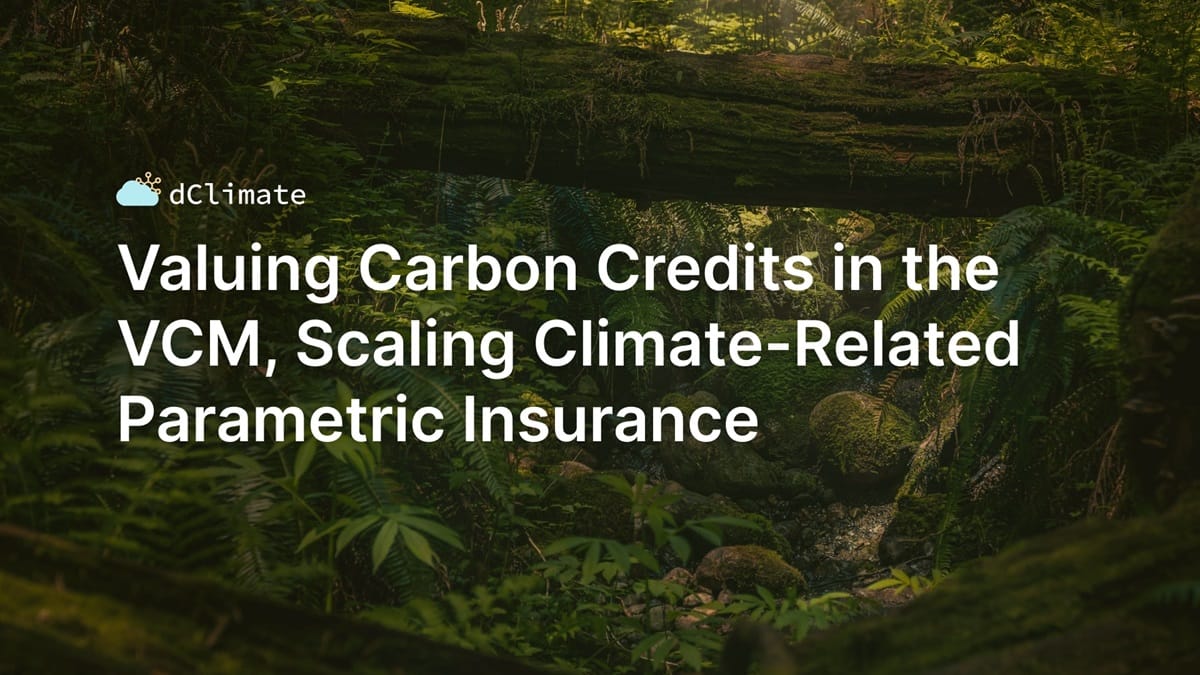Data ReFined #35: Valuing Carbon Credits in the VCM, Scaling Climate-Related Parametric Insurance

The Newsletter about Climate Data, Regenerative Finance, and Climate Risk ⛅
This issue of our biweekly newsletter features the latest news from the voluntary carbon market (VCM) and discusses the expanding role of parametric insurance in managing climate risks. Before diving into the latest industry news, we would like to invite you to our upcoming webinar:
Webinar: What is the True Value of a Carbon Credit?
Join dClimate’s next live webinar and a panel of industry experts on July 18 at 10 AM EDT as we explore carbon credit pricing, factors influencing their value, challenges in fair pricing, and solutions like data integrity, accessibility, and validation to enhance price transparency and discovery.
Sign up below to mark your calendar! 👇

Industry News

How to Find High-Quality Carbon Credits
Climate Collective and RMI recently published a report on data quality and integrity in the voluntary carbon market. The guide offers a data-driven, analytical, and practical framework to help buyers find, compile, analyze, and test the data supporting each carbon credit.
Download the report:

Subscribe here and join over 4000+ readers!
Jurisdictional REDD+ Carbon Credits
A new pricing guide by the Environmental Defense Fund (EDF) indicates that jurisdictional REDD+ carbon credit prices are projected to rise to $15 by 2028. Currently valued between $6 and $12, analysis shows increasing demand for high-quality credits. The report enhances market transparency and understanding to assist tropical forest nations in securing better financing and contracts.

A New Trading Platform for REDD+ Projects
Several regenerative finance organizations, including Neutral, Toucan, and Renoster, have come together to build a marketplace for REDD+ credits. The trading platform aims to improve forest preservation financing by pricing credits based on project quality and ensuring real-time, transparent transactions.


Scaling Climate-Related Parametric Insurance
Sid Jha, CEO and co-founder of Arbol, was interviewed on The Insurer TV to discuss the parametric insurer's plans after raising $60 million in Series B funding.
Watch the 12-minute interview:
Wildfire Risks for Forest Carbon Projects
Renoster's new analysis highlights the vulnerability of forest carbon offset projects to climate-related disasters, particularly wildfires. According to the study, nearly 50% of the projects have a medium or high risk of being impacted by wildfires, emphasizing the need for improved wildfire risk management and adaptation strategies to protect projects.

Parametric Insurance for Farmers
Allianz Colombia has launched a new parametric insurance product aimed at protecting Colombian farmers from the adverse effects of climate risks. The product is notable for being the first of its kind for Allianz in Latin America. It allows farmers to secure loans and insurance via an app or through local cooperatives.

Climate Risk Assessment Methods
A pan-European research project found significant gaps in climate risk assessment methods, potentially underestimating financial losses by up to 70%. The study urges using detailed, asset-specific data and considering extreme events to improve accuracy. Simplified proxies often fail to capture true risks, leaving businesses unprepared for rare but severe impacts.

GOES-19 in Geostationary Orbit
NOAA has announced that their latest GOES satellite has successfully reached geostationary orbit. Launched on April 7, 2024, GOES-19 is equipped with advanced instruments for weather forecasting, climate monitoring, and tracking severe weather events. It will enhance NOAA's ability to observe weather patterns and improve prediction capabilities.

One Year of 1.5°C Above Pre-Industrial Levels
June 2024 marked the 12th consecutive month with global temperatures 1.5°C above pre-industrial levels. While prolonged periods of elevated temperatures are uncommon, a similar streak of monthly global temperature records occurred in 2015–2016.

New AI Model for Weather Forecasts
Argonne National Laboratory has developed an advanced AI model to improve weather prediction accuracy and timeliness. This new model addresses limitations in current forecasting methods, offering better precision for extreme weather events even with low-resolution data.

Thank You For Reading Our Newsletter! 💙
We truly appreciate your interest and support! If you enjoyed this content, please consider forwarding this newsletter to your network to increase awareness of these critical climate topics.
Get Involved in Our Growing Community!
We welcome your contributions, comments, feedback, and likes. Follow us via the channels below to get involved! 👇
Twitter | LinkedIn | Telegram | YouTube
Learn more about the decentralized and open climate data ecosystem we are building via the links below!
🌐 Visit our website
👉 Check out our products
💽 Explore 40+ TB of free climate data via our data marketplace and API











